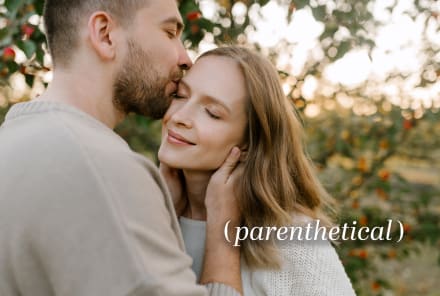Advertisement
This Is How Women Get Stranded In Unhealthy Relationships


The idea of "unconditional devotion" is in many ways a beautiful one—and one I've personally bought into for most of my life and still somewhat align myself with today. To love someone without conditions, without prerequisites, without concern for what they give you in return, and in spite of all their faults, flaws, mistakes, and hurtful altercations to come. It's the stuff our entire Western conceptualization of love is based around these days, as well as the movie narratives featuring grandiose displays of passion and sacrifice.
But for all the beauty and intimacy that can come from forging a bond based on unconditional devotion, that type of commitment can also be what keeps people trapped in otherwise unhappy relationships—particularly women.
How women get stranded in relationships that no longer serve them.
When you've committed to loving your partner no matter what they do, it makes it easy and acceptable to put up with unsavory behavior even when it goes too far—or to go along with an unsatisfying relationship that may not hurt but still drains, numbs, or simply doesn't quite feel right.
Women, in particular, receive tacit encouragement to make their relationships work, even those that are flawed, harmful, or simply not serving them. This happens in two specific ways:
Women have been taught to prioritize having successful relationships.
In most cultures, women are raised to place more importance on having successful relationships than men are. It's the reason every heroine in a movie needs a male love interest, why professional women are asked questions about "having it all" when men aren't, why women not married by age 30 are called "leftover women" in some parts of China—the list of examples goes on and on.
"Women have a harder time ending relationships in general than men do—and yes, that's absolutely because of socialization," Kara Loewentheil, master confidence coach and host of the UnF*ck Your Brain podcast, tells mbg. "Women are socialized to believe that their value comes from male approval and that being in a romantic relationship is their highest aim and goal in life. Even women who are raised with feminist values and who care about their career and personal happiness are still growing up in a culture where romantic 'success' is constantly portrayed as a woman's highest calling and fulfillment."
In her book Hard to Do: The Surprising, Feminist History of Breaking Up, journalist Kelli María Korducki outlines the social, economic, and political historical events that led to women finally being able to not only choose the relationships they wanted to be in but also leave unsatisfactory ones freely. Although women are no longer tied to unhappy relationships because of a lack of property rights or moneymaking power today, Korducki points out that the advent of love marriage as a replacement for economic marriages didn't necessarily free women from the pressure to find a husband. The social ostracization inherent in "spinsterhood" was still too great.
"With the emergence of a companionate, affectionate marriage ideal came increased social pressure for women to endeavor upon the project of cheerful domesticity," Korducki writes. "Marriage and the family became recoded as arenas for women's spiritual actualization, the locus for pure fulfillment as opposed to a plane of existence largely grounded in duty. In a sense, post-Enlightenment wifehood took on the set of signifiers we still see reinforced by a certain style of mommy blog and lifestyle Instagram account in the 21st century."
Today, women experiencing a breakup are still often seen as personal failures (see: the whole hoopla over Jennifer Aniston "losing" Brad Pitt to Angelina Jolie back in the day). Add that to the myth of how rare a "good man" is to find, Loewentheil points out, and it's not surprising that women might be reluctant to leave a relationship they've already secured.
"Of course a woman is going to be more inclined to stay in a relationship that isn't really what she wants because the alternative she sees is feeling lonely, used up, not good enough, invalidated, and having to start the process all over again," Loewentheil says. "The real tragedy is that in encouraging women to believe that happiness and worth come from their romantic relationships, we actually end up creating a situation where so many of them stay in unhappy relationships because they would rather be with someone than no one."
Women are raised with more empathy and caretaking intuition.
Women tend to be more empathetic than men, and genes don't explain much of it. As a society, we expect girls and women to be more understanding toward other people's feelings, have better people skills, and be better caretakers—it's why girls are encouraged1 to speak softly, be more accommodating, participate in kitchen and household tasks, and play with baby dolls and toy kitchens.
These emotional skills are key to having better self-awareness, healthier relationships, and more compassion for others throughout your life, of course—but that empathy can also sometimes backfire. Research shows people are more likely to stay in unhappy relationships when they feel the other person needs the relationship, and because of the way they're raised, women are all the more likely to be hypersensitive to their partner's needs and to prioritize their partner's happiness above their own.
It's not hard to see why this socialization might lead to a lot of women sticking it out in relationships that don't really bring them much personal happiness.
"Empathetic people are great at explaining other people's crappy behavior away," psychotherapist and executive coach Perpetua Neo explains. "In unhealthy relationships, sometimes the other party pays lip service, saying they'll change. And as the nurturer, we want to help them change. Except that keeping them accountable is what gets us sucked in."
How to know when your devotion is holding you back.
Are you staying in your relationship because it's one worth fighting for—or because you feel a subconscious pressure to make it work, even if it's not really want you want? It's a tough question to answer because it involves deeply interrogating the roots of your beliefs around love, how you were raised to view relationships, and the true nature of your bond with your partner.
Here are a few ways to help you reflect and recognize when it's really time to leave:
1. Consider where you learned your style of commitment.
We all learn how to love from somewhere or someone, Neo says: "Who were your models of unconditional devotion? For instance, if Mom and Dad are extremely devoted to each other, it may be because they both deserve it! They both may be the types who make things work and love and respect each other." Can you say the same for your partner?
2. Ditch the belief that your partner needs to be full-on toxic before you have a reason to leave.
"It isn't about whether someone is 'full-on toxic' or not. They exist on a spectrum," Neo explains. "It isn't about whether you sometimes exhibit toxic behaviors; we all do."
Here's the real question you need to ask yourself, according to Neo: Is this person good to me and for me?
You don't need a reason to leave. If you want to leave, that's reason enough.
3. Ask yourself this: Is your partner as invested in you as you are in them?
Even if you're still investing energy in the relationship, it's important to recognize whether you're getting that same investment back from your partner, clinical sexologist and sex therapist Cyndi Darnell tells mbg. This is especially important for highly empathetic women who feel deep devotion to their partner. Is your level of devotion matched and returned to you? If it's not, you need to be able to release yourself from the commitment you've self-created.
"If your partner has already given up on you, it's hard to give them up too," Darnell says. "It's important to remember relationships are a choice, not an obligation."
4. Make lists and write letters. Lots of them.
Contrary to lessons you may have taken away from Ross and Rachel's relationship on Friends, Darnell is a big proponent of making lists to help you weigh your decision to stay or leave. "Write a pros and cons list. Literally," she recommends. "Reflect on the contents of the list and ask yourself, Is this worth it? Write the reasons why and why not. Write a letter to yourself defending the relationship. Then write another prosecuting it."
Pay attention to your gut—the physical sensations inside you—as you go through this process. As you make a case for both possible paths forward, Darnell says the answer may just come to you: "Check in with your body—which process resonated more? The body holds deep wisdom in these situations."
5. Get some distance.
Darnell recommends taking some time to separate yourself from the situation. "Imagine it was a friend telling you their story," she suggests. "What advice would you give your friend? Sometimes it's more effective when we take ourselves out of the equation a little bit."
6. Get real.
Here are a few powerful questions Loewentheil recommends asking yourself:
- "If I knew there was plenty of love out there for me, and I could meet someone else, would I stay in this relationship?"
- "If I knew I could be happy as a single person, would I stay in this relationship?"
- "What feelings and thoughts am I afraid I would have if I left this relationship? Do I want to believe those thoughts? Am I willing to have those feelings in order to experience what might be on the other side?"
- "If I knew I could feel good about myself however my partner acted, would I stay in this relationship?"
- "What thoughts and feelings am I wishing I would magically think and have if I had a different partner?"
"What all these questions have in common is that they are ways of asking your brain to separate your thoughts and feelings from your circumstances," she explains. "No relationship causes your feelings or actually validates you or means anything about you. All of that is caused by your thoughts. So asking questions like these can help illuminate why you are staying in a relationship or why you are leaving it to make sure that you aren't making these decisions based on wanting someone else to deliver validation, confidence, or worth to you—because they never can or will."
Watch Next
Enjoy some of our favorite clips from classes
Enjoy some of our favorite clips from classes
What Is Meditation?
Mindfulness/Spirituality | Light Watkins
Box Breathing
Mindfulness/Spirituality | Gwen Dittmar
What Breathwork Can Address
Mindfulness/Spirituality | Gwen Dittmar
The 8 Limbs of Yoga - What is Asana?
Yoga | Caley Alyssa
Two Standing Postures to Open Up Tight Hips
Yoga | Caley Alyssa
How Plants Can Optimize Athletic Performance
Nutrition | Rich Roll
What to Eat Before a Workout
Nutrition | Rich Roll
How Ayurveda Helps Us Navigate Modern Life
Nutrition | Sahara Rose
Messages About Love & Relationships
Love & Relationships | Esther Perel
Love Languages
Love & Relationships | Esther Perel
What Is Meditation?
Box Breathing
What Breathwork Can Address
The 8 Limbs of Yoga - What is Asana?
Two Standing Postures to Open Up Tight Hips
How Plants Can Optimize Athletic Performance
What to Eat Before a Workout
How Ayurveda Helps Us Navigate Modern Life
Messages About Love & Relationships
Love Languages
Advertisement

The 4 Pillars That Lead To Long-Lasting Relationships, From A Marriage Counselor
Rachel Glik, Ed.D., LPC

The 4 Pillars That Lead To Long-Lasting Relationships, From A Marriage Counselor
Rachel Glik, Ed.D., LPC









